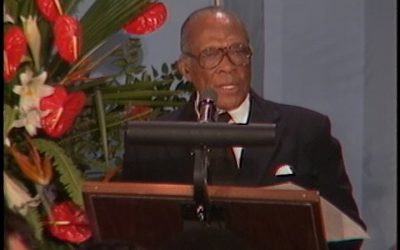In the annals of Jamaican history, the name Sir Florizel Augustus Glasspole stands as a symbol of steadfastness, statesmanship, and unwavering dedication to the principles of democracy. Born in Kingston, Jamaica, on 25 September 1909, Glasspole’s life journey encompassed not only the corridors of power but also the heart of the labour movement that helped shape Jamaica’s socio-political landscape.
Early years and labour advocacy
Glasspole’s early life was marked by a pursuit of knowledge and a relentless drive for progress. Educated at the prestigious Wolmer’s Boys’ School, he ventured abroad to McGill University in Canada, where he honed his skills in electrical engineering. Yet, it was upon his return to Jamaica that he would truly make his mark.
In 1944, in tandem with the legendary Sir Alexander Bustamante, Glasspole co-founded the Bustamante Industrial Trade Union (BITU). This labour movement would become a powerful voice for the rights of workers in Jamaica, marking a turning point in the nation’s labour history. Glasspole’s dedication to the welfare of the working class earned him a reputation as a champion of their cause.
Governor-General and unifying figure

The zenith of Glasspole’s public service career came with his appointment as Governor-General of Jamaica in 1973, a role he would hold with distinction until 1991, spanning several terms of different Prime Ministers. During his tenure, Jamaica underwent significant changes, transitioning to a parliamentary republic in 1962. In this ceremonial role, Glasspole proved to be a unifying figure, maintaining stability and continuity during periods of political change.
Legacy and recognition
Sir Florizel Glasspole’s legacy endures as a testament to his statesmanship, dedication to democracy, and tireless efforts on behalf of the Jamaican people. In recognition of his contributions, he was knighted by Queen Elizabeth II in 1983, becoming Sir Florizel Glasspole. His unwavering commitment to the principles of democracy, justice, and the rule of law continues to resonate in the collective memory of Jamaica.
Sir Florizel Glasspole passed away on 25 March 2000. Still, his legacy as a leader, labour advocate, and statesman continues to be celebrated in Jamaica’s history and political tradition. In a nation marked by its rich history and vibrant culture, Sir Florizel Glasspole occupies a unique place—a beacon of unity, progress, and the enduring spirit of Jamaica’s political landscape.






Leave a Reply